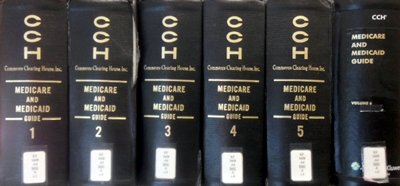The resources included here cover public health insurance, including Medicare, Medicaid, government hospitals, and other government-financed health programs. In addition, these resources address treatment of anyone coming into an Emergency department by the Emergency Medical Treatment and Labor Act (EMTALA).
 Medicare and Medicaid Guide
by
CCH Business Law Editors
Medicare and Medicaid Guide
by
CCH Business Law Editors
 Medicaid Update
by
Sandra J Alexander; National Business Institute
Medicaid Update
by
Sandra J Alexander; National Business Institute
 AHLA's Guide to Health Care Legal Forms, Agreements, and Policies
by
American Health Lawyers Association
AHLA's Guide to Health Care Legal Forms, Agreements, and Policies
by
American Health Lawyers Association
VitalLaw (previously Wolters Kluwer Cheetah) provides access to Medicare and Medicaid Guide Explanations and Annotation - Topically arranged explanations of Medicare and Medicaid, with accompanying annotations. The explanations provide a concise overview of every aspect of the Medicare and Medicaid programs. The annotations are summaries of the official documents (law, regulations, administrative decisions, court decisions, etc.) related to each explanation. "Smart Relate" buttons at the top of individual documents link to a list of related documents going back to 2008. Updated several times each year, as warranted by new laws, regulations, and decisions.
Bloomberg Law - Health Law & Business Portfolios - Includes:
Portfolio 1300: Payments for Hospital Services Under Medicare Parts A and B - This portfolio describes the various systems used to pay the costs hospitals incur providing care to Medicare patients. Medicare does not use a single payment method to cover all hospital costs, but instead utilizes a variety of methodologies, depending on the type of cost and the type of hospital. In general, Medicare uses prospective payment systems that pay hospitals a relatively fixed, per-discharge amount based on the average cost of treating a patient with a particular condition. Various adjustments are made, such as those for outlier patients and rural providers.
It begins with a detailed description, including examples and analysis of recent trends and upcoming changes, of the current inpatient prospective payment system for acute care hospitals—the system used to pay all Medicare-participating hospitals except those exempt by statute. The portfolio then provides similar analysis of the unique prospective payment systems for those facilities and hospital units that are exempt from the inpatient system, including long-term care hospitals, inpatient rehabilitation facilities and inpatient psychiatric facilities, as well as the system of payment for outpatient costs. The portfolio concludes with a discussion of unique payment methods, such as those that apply to Medicare bad debts and payment for hospitals that do not participate in Medicare.
Portfolio 1350: Medicare Appeals: Practice and Procedures - Designed for both the experienced health care law practitioner and those new to the field, this portfolio addresses both the legalities and practicalities of pursuing Medicare appeals. It starts with an overview of the Medicare Program and a description of various entities that play a role in the Medicare appeals processes. It then addresses the more technical legal issues of jurisdiction, reopenings, standard of review, deference, remedies, estoppel, and use of stipulations. The final chapters of the portfolio focus on the following four appeals processes: Appeals of Parts A and B Fee-for-Services Claims, Cost Report Appeals, Appeals of National and Local Coverage Determinations, and Appeals of Entitlement Determinations. Finally, the portfolio provides an array of practice tools, including sample forms and checklists designed to assist the reader in requesting appeals at various stages.
